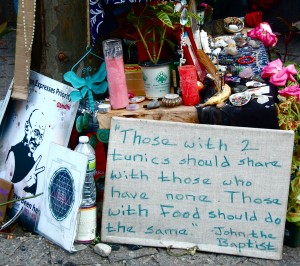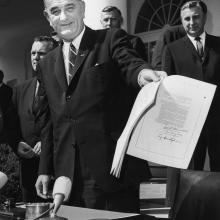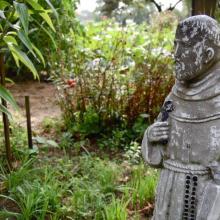faith community
MUCH OF THE country is still on lockdown to save countless lives by slowing the spread of COVID-19. The economic consequences for families, and especially for the most vulnerable people, are incalculable and rising by the day. The U.S. has the most confirmed cases of the disease in the world, with a staggering death toll. All of us have friends and loved ones who are sick or who have died, and hospitals in many parts of the country are under enormous strain.
It’s critical that—even as we stand apart from each other for our physical health—we find new ways to stay together for our mental, emotional, and spiritual health. Our physical health requires social distancing in a pandemic, but maintaining our spiritual health means we can’t let that lead to social isolation, especially for the most vulnerable. Even as we live more separated, we must find new ways to be together.
Turning from physical contact with others must not cause us to turn away from each other, but rather turn to each other in better, deeper, and healthier ways. How can we stay in even closer contact, over our phones and social media, with friends, family, and especially people who are alone; see what they need; and help them not feel so isolated and afraid? The answers must stem from active, creative, and innovative faith that leads to action.
How does this happen in our hometown? We read about it and see it all too frequently on the news in other parts of the nation. But not here, not in our home. What are we to do with a tragedy of this magnitude in our community?
It would be God’s incarnate presence in human life. Not the only presence, but one that many people could enter into. Not so much an institution with structures, rules, and layers of leadership, but rather a dynamic, ever-shifting community that gathered in various ways, ranging from small circles of friends to mass assemblies for special purposes.
It would look outward, unlike other human institutions that look inward. It would see people wanting to draw closer to God. It would see human needs such as grief and tragedy, hunger and hopelessness. It would see key moments in people’s lives, such as partnering and parenting. It would see the ways people hurt each other and the tendency of injustice to become systemic.
I had a conversation with a young woman I met at a conference recently. The conversation rocked me.
I represented the faith voice on a panel at a major secular conference for philanthropists. The panel focused on the question: “What are we not talking about?”
One of my colleagues focused on the nonprofit sector’s inability to make real just change in our world because they are bound by the interests of donors who are, themselves, part of the 1 percent. Another colleague focused on the glut of nonprofits offering similar services in otherwise abandoned communities. I focused on the need for social movements to bring about a more just world and the role of faith communities in those movements, in particular.
Imagine the moral authority that church leaders could exercise if they turned their eyes outward to a needy world, rather than endlessly surveying the insider crowd for what they want and are willing to pay for.
Imagine if we allowed worship to change in order to make it more accessible to the world. Imagine devoting our resources to reaching younger adults and families seeking fresh purpose in a stale world. Imagine buildings being re-purposed for community needs.
Imagine a church that was giving itself away to the "least of these." And when givers push back, imagine lay and clergy leaders saying boldly, "This church isn't for sale. We have a larger purpose than keeping you happy and comfortable. This church isn't about us. It is about God and the next people whom God is trying to reach."
 One of the constant threads in scripture is, "Give us this day our daily bread." Nothing more, nothing less. Underneath this admonition is the assumption that the more we store up for tomorrow the less people will have for today. And in a world where 1 percent of the world owns half the world's stuff, we are beginning to realize that there is enough for everyone's need, but there is not enough for everyone's greed. Lots of folks are beginning to say, "Maybe God has a different dream for the world than the Wall Street dream."
One of the constant threads in scripture is, "Give us this day our daily bread." Nothing more, nothing less. Underneath this admonition is the assumption that the more we store up for tomorrow the less people will have for today. And in a world where 1 percent of the world owns half the world's stuff, we are beginning to realize that there is enough for everyone's need, but there is not enough for everyone's greed. Lots of folks are beginning to say, "Maybe God has a different dream for the world than the Wall Street dream."
Maybe God's dream is for us to live simply so that others may simply live. Maybe God's dream is for the bankers to empty their banks and barns so folks have enough food for today.
Today (Oct. 4) Christians around the world celebrate the life of St. Francis of Assisi, one of the bright lights of the church and one of the most venerated religious figures in history.
The life and witness of Francis is as relevant to the world we live in today as it was 900 years ago. He was one of the first critics of capitalism, one of the earliest Christian environmentalists, a sassy reformer of the church, and one of the classic conscientious objectors to war.
"OK to all those attacking Tavis and Dr. West and me for hosting the Poverty tour, can you get off your Hating a second to look at todays latest report: POVERTY is at its highest record in American History!!! People are Dying out here! Don't care what you think of Tavis, Cornel or me, but PLEASE PLEASE care about our Brothers and Sisters who have been made to feel invisible and disposable!"
-- Rev. Michael Pfleger, pastor of the Faith Community of St. Sabina, a Roman Catholic parish on Chicago's South Side, in a posting on his Facebook page Wednesday morning.
"Do you think God sent Hurricane Irene?" a young man asked me with a curious look in his eyes that was as innocent as it was pensive.
My mind flashed back to a headline I remembered reading yesterday about Glenn Beck pronouncing the hurricane as "a blessing" from God.
As I heard the kid's question, my heart sunk, as I thought of all the rhetoric that has made God out to be a monster, or at least a punitive judge on a throne ready to zap folks with lightening bolts or hurricanes
So let me suggest that this Labor Day, the church cannot afford to perpetuate the labor movement as an unexamined challenge in our society. Debates about the role of unions are everywhere, and demand thoughtful theological discussion, consideration, and action.
This Labor Day weekend, we are challenging every congregation and faith community in Ohio and around the nation to devote a portion of your worship service to exploring a biblically informed perspective on labor. This could include part of a homily, a testimony, a time of prayer for labor members in your parish, church, or faith community, or hosting a special conversation or panel on issues of faith and labor.
I admit it: A few years back, when I first heard about the E-Verify program, I thought it sounded reasonable. The program was described to me as a way for employers to voluntarily verify the U.S. citizenship of their employees by cross-checking their information with the online databases of the Department of Homeland Security and the Social Security administration. I knew that there were flaws in the system, which sometimes misidentified workers as undocumented even when they were not. However, I thought, what employer doesn't deserve the right to check the employment eligibility of his or her workers?
The debate we have just witnessed has shown Washington, D.C. not just to be broken, but corrupt. The American people are disgusted watching politicians play political chicken with the nation's economy and future. In such a bitter and unprincipled atmosphere, whoever has the political clout to enforce their self-interest and retain their privileges wins the battles. But there are two casualties in such political warfare: the common good and the most vulnerable.
So how will vulnerable people fair under this deal? "The Circle of Protection," a diverse nonpartisan movement of Christian leaders, has been deeply engaged in the budget debate to uphold the principle that low-income people should be protected. But it is hard to evaluate a deal that averts a crisis when the crisis wasn't necessary in the first place. Over the past few weeks, our economy has indeed been held hostage as politicians negotiated the price of the release. Ultimately, I think most of us wish that no hostages had been taken in the first place, and this was no way to run a government or make important budget decisions.
You don't need a ton of proof to know that more and more churches are struggling to survive. It seems churches that are in this predicament have one of two options: revive or die. There are a lot of books, seminars, and workshops given on how to go about reviving a church. However, there is not one cookie cutter, full-proof, and effective strategy in reviving a church. Having said that, it doesn't mean that it is impossible. There are many examples of struggling churches that have successfully revived the congregation, increased the health of the church, and expanded their ministry.







